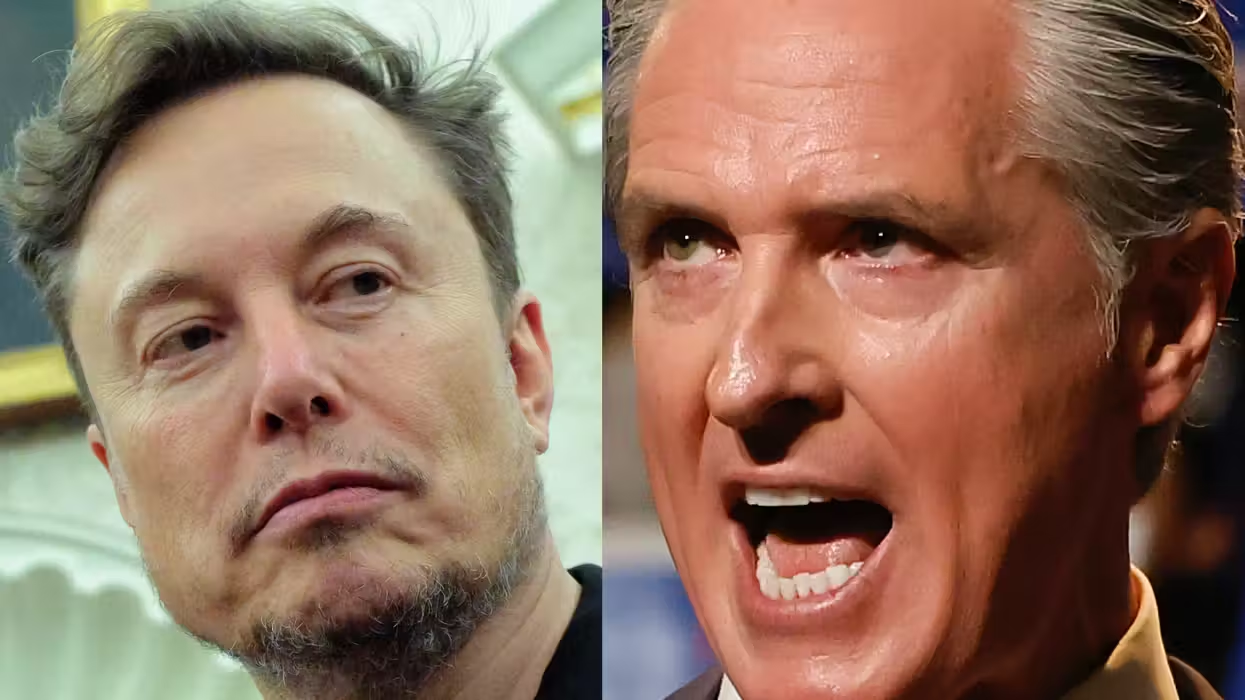
© 2025 Blaze Media LLC. All rights reserved.
Bret Stephens of the Israel-hating New York Times published an absurd column Wednesday denouncing President Trump as “bad for Israel.”
In his piece, titled “Donald Trump is bad for Israel,” Stephens proclaims that Israel is far worse off than ever before with President Trump in the Oval Office.
The piece has been shared widely on social media by NeverTrumpers on the right and people who don’t really care about Israel but now recognize that it might be politically advantageous to pretend to care about Israel.
“What Israel most needs from the U.S. today is what it needed at its birth in 1948: an America committed to defending the liberal-international order against totalitarian enemies,” Stephens writes, adding, “as opposed to one that conducts a purely transactional foreign policy based on the needs of the moment or the whims of a president.”
It is lazy and incorrect to label President Trump’s foreign policy as implementing a “transactional” or “isolationist” agenda. Through his rhetoric and policies, it’s clear that the president rejects Stephens' preference for nation-building and long-winded intervention in Islamic civil wars, which he masks as “defending the liberal-international order.” President Trump more accurately identifies as a restraint-minded realist, who campaigned on bringing Americans soldiers home from long, unaccomplished wars in the Islamic world. But the president has shown the willingness to deploy kinetic action against our various enemies and adversaries if necessary. Indeed, it is Stephens’ ideology, embraced by past administrations, that led to painful Israeli land concessions, an Iraqi vacuum filled by Iran, and the empowerment of Islamists across the region — that is quite bad for Israel.
Advocating for his U.S. foreign policy preferences, Stephens says:
From that, everything follows. It means that the U.S. should not sell out small nations — whether it was Israel in 1973 or Kuwait in 1990 — for the sake of currying favor with larger ones. It means we should resist interloping foreign aggressors, whether it was the Soviets in Egypt in the 1960s, or the Russians and Iranians in Syria in this decade. It means we should oppose militant religious fundamentalism, whether it is Wahhabis in Riyadh or Khomeinists in Tehran or Muslim Brothers in Cairo and Ankara. It means we should advocate human rights, civil liberties, and democratic institutions, in that order.
“Trump has stood all of this on its head,” he concludes.
Oddly, Stephens is effectively endorsing U.S. foreign policy under President Trump. This president has instituted punishing sanctions against Moscow for its military aggression and has taken direct action against Russia on several fronts. He withdrew from the Iran nuclear deal and imposed harsh and effective sanctions against Tehran, and he has endorsed the aspirations of self-government for the Iranian people. He has supported the Saudi monarchy’s battle against Wahhabi forces both domestically and abroad. He has stood with Egyptian President Abdel Fattah el-Sisi against the Muslim Brotherhood in Cairo. The only legitimate grievance Stephens has in the aforementioned paragraph is President Trump’s friendliness with the regime in Ankara, which supports the Muslim Brotherhood. But on every other issue, Stephens is misleading his audience and/or incorrectly identifying President Trump’s foreign policy.
Stephens continues:
He shows no interest in pushing Russia out of Syria. He has neither articulated nor pursued any coherent strategy for pushing Iran out of Syria. He has all but invited Turkey to interfere in Syria. He has done nothing to prevent Iran from continuing to arm Hezbollah. He shows no regard for the Kurds. His fatuous response to Saudi Arabia’s murder of Jamal Khashoggi is that we’re getting a lot of money from the Saudis. He speaks with no authority on subjects like press freedom or religious liberty because he assails both at home. His still-secret peace plan for Israel and the Palestinians will have the rare effect of uniting Israelis and Palestinians in their rejection of it.
It’s odd that Stephens is lighting up the president for his Syria policy, when just last week, he was singing the praises of Defense Secretary James Mattis, who is largely responsible for implementing the Syria policy. It was Mattis, hell-bent on his “only ISIS” approach to the Syrian civil war, who showed no interest in pushing back against Tehran, Moscow, or Ankara.
In fact, Mattis’ “only ISIS” approach to the war in Syria is hurting Israel and paving Iran’s land bridge from Tehran to Beirut. By solely focusing on the Sunni insurgency, Secretary Mattis was doing the heavy lifting for Russia, Iran, and the Assad regime. If Stephens is indeed concerned with who is best for Israel, he should be thanking the president for ending the broken Syria military policy that continued to empower Israel’s and America’s shared adversaries.
As for Jamal Khashoggi, it’s interesting that Stephens is bringing him up in an article about Israel, considering that the non-journalist Saudi operative-turned-Qatari asset hoped Israel would “die by force” at the hands of the Palestinian terrorist group Hamas.
Stephens then turns completely delusional on “press freedoms” and “religious liberty,” considering the fact that President Trump has done absolutely nothing to censor either of these fundamental rights, unless you consider temporarily revoking Jim Acosta’s hard pass an urgent press freedom issue.
Yet the columnist from the Israel-hating New York Times presses on. “Is any of this good for Israel?” he asks.
He begins by recycling his aforementioned shoddy arguments against Iran, Russia, and Turkey. Then Stephens badly exposes the lack of intellectual depth in his piece.
“If you think that another grave threat to Israel is the inability to preserve at least a vision of a future Palestinian state — one that pursues good governance and peace with its neighbors while rejecting kleptocracy and terrorism — the answer is no,” he concludes.
In his endorsement of a two-state solution for Israel and a “future Palestinian state,” Stephens is essentially calling for the reality of a terrorist state next to Israel. The Palestinian national movement began as a reaction to the Zionist movement that brought about the modern state of Israel. Since its beginnings, the Palestinian movement has been led by jihadi terrorists who committed themselves to Israel’s annihilation. Both the Palestinian Authority and Hamas, the terrorist group that rules the Gaza Strip, have a long history of inciting terrorism, directing terrorist attacks, and widely endorsing all forms of violence against Israel and its people.
Stephens ends his piece by proclaiming that President Trump is worse on Israel than President Barack Obama:
During the eight years of the Obama presidency, I thought U.S. policy toward Israel — the hectoring, the incompetent diplomatic interventions, the moral equivocations, the Iran deal, the backstabbing at the U.N. — couldn’t get worse. As with so much else, Donald Trump succeeds in making his predecessors look good.
Utter nonsense. President Trump’s foreign policy has helped reinforce a bond between Israel and the United States government that was badly damaged under the Obama regime, when top officials were constantly threatening and harassing Israel and seemingly endorsing its enemies’ ambitions against it.
By moving the U.S. embassy in Tel Aviv to Jerusalem and recognizing Jerusalem as Israel’s capital, President Trump helped the Jewish state restore its rightful claims to sovereignty over its lands. President Trump’s leadership on the Jerusalem issue, coupled with his unapologetic defense of the U.S.-Israel alliance, has encouraged other countries — even Arab-Muslim states in the region — to forge diplomatic cooperation with Israel, some for the first time. That only increases Israel’s economic independence.
Israel still faces many diplomatic and military challenges. Hezbollah and the Iranian regime continue to encroach on its borders, heightening the prospect of a coming regional war of unprecedented proportions. However, should Israel once again be forced to defend itself against radical Islamist actors, it will find that it has no greater friend than President Trump in the White House.
#mc_embed_signup{background:#fff; clear:left; font:14px; }
/* Add your own MailChimp form style overrides in your site stylesheet or in this style block.
We recommend moving this block and the preceding CSS link to the HEAD of your HTML file. */
Want to leave a tip?
We answer to you. Help keep our content free of advertisers and big tech censorship by leaving a tip today.
Want to join the conversation?
Already a subscriber?
more stories
Sign up for the Blaze newsletter
By signing up, you agree to our Privacy Policy and Terms of Use, and agree to receive content that may sometimes include advertisements. You may opt out at any time.
Related Content
© 2025 Blaze Media LLC. All rights reserved.
Get the stories that matter most delivered directly to your inbox.
By signing up, you agree to our Privacy Policy and Terms of Use, and agree to receive content that may sometimes include advertisements. You may opt out at any time.






